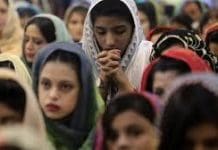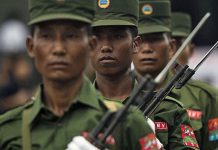(ADDS MORE DETAILS, MORE CASES)
By Jawad Mazhar, BosNewsLife Special Correspondent reporting from Pakistan

OKARA, PAKISTAN (BosNewsLife)– Amid rising Islamic extremism, Pakistani Christians have demanded a halt to the destruction of a Christian cemetery in Punjab province and the return of a seized church in the provincial capital Lahore, BosNewsLife monitored Thursday, June 11.
Local authorities approved the recent bulldozing and digging up of Christian graves in the Pakistani city of Okara to build a recreational park there, said advocacy group All Pakistan Minorities Alliance (APMA) and a Christian legislator.
Last month, Christians prevented further destruction and “the scattering of remains of Christians”, by forcing workers of the regional Tehsil Municipal Authority (TMA) to leave their bulldozers and cranes behind, said APMA’s Okara Zone Chief Boaz Amir.
Amir and Punjab Christian legislator Tahir Naveed Chaudhary told BosNewsLife they condemned “the heinous crime committed by TMA and accomplices.” They urged Okara Police to launch a criminal investigation against TMA staff and a Muslim legislator and private school owner who were allegedly involved in planning the recreational park on the Christian cemetery site.
MORE INCIDENTS
The unrest in Okara came shortly after elsewhere in Punjab province Pakistan Railway authorities reportedly confiscated a church building after Muslim leaders complained about the church ringing its bells and using loudspeakers to call Christians to prayer.
Rights group International Christian Concern (ICC) said the St. Andrew’s Church in Lahore was seized on April 28. ICC said however that Christian Railway employees have been protesting the confiscation “vehemently” for the last several weeks.
The local Church Committee reportedly said authorities originally granted Christians written permission to use the building on Sundays for worship services.
“However, when the church began using its bells and loudspeakers to invite Christians to morning and evening prayer services, Muslim leaders complained that the church was interfering with their five-times a day call to prayer and thus insulting Islam,” ICC said.
CHURCH CLOSED
On April 28, Christians reportedly arrived at the church to find the doors sealed shut with a notice prohibiting anyone from entering the building. “Christians responded by conducting a hunger strike and demonstrating in front of the Lahore Press Club for the next several days,” ICC said.
The stand-off apparently continued Thursday, June 11 with Muslim officials “trying to obtain permission to demolish the church so that they can build another mosque,” the group added.
“Most of the Christians who attended the church are employed to clean the sewage from Railway buildings and are very poor. They continue to protest the confiscation of the church by staging sit-in strikes and additional hunger strikes.”
The Lahore church case resemble troubles experienced by nine pastors from two neighboring villages in Pakistan, who locals say could face prison time for using loudspeakers to broadcast prayers and sermons from their churches on Easter Sunday.
Martinpur and Youngsnabad, some 150 kilometers (93 miles) east of Lahore are majority Christian villages, but Muslim security forces detained pastors Hafeez Gill, Fahim John, Maksud Ulkaq, and a catechist from the Catholic Church in Youngsnabad identified only as Saqab on May 16 to receive bribes, investigatiors said.
Following a public outcry from their parishioners, they were released several hours later, but the Centre for Legal Aid Assistance and Settlement (CLAAS) said it fears more difficulties for the church leaders.
ISLAMIC EXTREMISM
The latest incidents underscored mounting religious tensions in Punjab province and elsewhere in Pakistan, where Christian leaders are reportedly also being threatened with prosecution under Pakistan’s controversial Blasphemy Laws.
Rights groups have suggested that Islamic extremism has been on the rise amid the growing influence of militant groups such as the Taliban, with which the army has fought deadly battled in recent weeks.
In the latest violent incident, suicide attackers, believed to be from the Taliban group, shot their way past guards and set off a massive blast Tuesday, June 9, outside a luxury hotel where foreigners and well-to-do Pakistanis mixed, killing at least 11 people and wounding 70, officials said.
The bombers struck the Pearl Continental Hotel Peshawar, capital of Pakistan’s North-West Frontier Province, when nightlife was still in swing, witnesses said. Television footage showed the attack reduced a section of the hotel to concrete rubble and twisted steel, leaving a huge crater in a parking lot.
Kidnappings, killings, and scores of deadly blasts linked to Taliban militants have terrified Pakistanis, including Christians and foreigners, with seven bombs in the past month alone killing nearly 50 people.
COURT TROUBLES
Muslim militants have also been involved in intimidation, including trying to influence court cases against Christians, according to CLAAS investigators. Last month, a mob, described by rights observers as “Radical Pakistani Muslims” reportedly overran a court near Lahore to pressure a judge in a “blasphemy” case against a Christian couple, and a member of the prosecution later threatened to kill the wife.
Some 50 Muslim leaders burst into the courtroom in Mustafabad, May 14 where a bail hearing was taking place in the case against Munir Masih and his wife Ruqiya Bibi, CLAAS said. The couple had granted a Muslim neighbor’s request to store some of his possessions in their home, including a Quran, but Islamic clergymen storming the courtroom reportedly said non-Muslims had no right to keep a Quran in their home.
After the bail hearing, a member of the prosecution team approached Bibi threatening to kill her “whatever the decision,” said CLAAS’s Tahir Gull, who represents the couple. There were no immediate comments from officials.
Christians comprise less than five percent of Pakistan’s over 176 million people and have experienced growing persecution, rights investigators say. (BosNewsLife’s Stefan J. Bos at BosNewsLife News Center contributed to this story).








